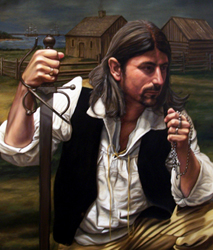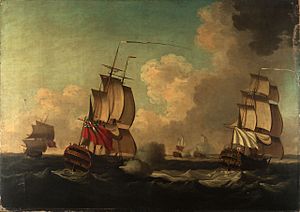Joseph Broussard facts for kids
Quick facts for kids
Joseph Broussard
|
|
|---|---|
 |
|
| Nickname(s) | Beausoleil |
| Born | 1702 Port-Royal, Acadia, New France (present-day Annapolis Royal, Nova Scotia, Canada) |
| Died | 1765 (aged 62–63) St. Martinville, Iberia Parish, Louisiana, New Spain (present-day Loreauville, Louisiana, U.S.) |
| Buried |
Unknown location near Loreauville, Louisiana
|
| Allegiance | |
| Service/ |
Acadian militia |
| Rank | Captain |
| Battles/wars | Father Rale's War
|
| Other work | Led Acadians to Louisiana. Militia captain of the Acadians of the Atakapas |
Joseph Broussard (1702–1765), also known as Beausoleil (meaning "Beautiful Sun" in English), was an important leader of the Acadians. The Acadians were a group of French settlers who lived in a region of North America called Acadia. This area is now parts of Nova Scotia, Prince Edward Island, and New Brunswick in Canada.
Broussard helped organize groups of Mi'kmaq and Acadian fighters. They fought against the British during several wars, including King George's War, Father Le Loutre's War, and the French and Indian War. After the British took control of Acadia, Joseph Broussard led the first group of Acadians to settle in southern Louisiana in what is now the United States. He is seen as a hero and a key historical figure by both Acadians and Cajuns (who are descendants of Acadians in Louisiana).
Contents
Joseph Broussard's Early Life
Joseph Broussard was born in Port-Royal, Acadia, in 1702. His father was Jean-François Broussard, and his mother was Catherine Richard. His father came from a place called Poitiers in France. His mother was born right there in Port-Royal.
Joseph Broussard spent much of his life at a place called Le Cran. Today, this area is known as Stoney Creek in Albert County, New Brunswick. It is located along the Petitcodiac River. He lived there with his wife, Agnes, and their eleven children.
During a conflict known as Father Rale's War, Broussard took part in a military action. This action was a raid on Annapolis Royal, Nova Scotia in 1724.
Fighting in King George's War
During King George's War, Joseph Broussard became a leader in the resistance against British rule in Acadia. He was inspired by a French priest named Jean-Louis Le Loutre. Broussard's fighting groups often included Mi'kmaq militia. The Mi'kmaq people were long-time friends and allies of the Acadians. In 1747, Broussard was involved in the Battle of Grand Pré.
Conflicts in Father Le Loutre's War
After Fort Beausejour was built in 1751, Broussard joined Jean-Louis Le Loutre there. Broussard wanted to stop British settlers from moving into Acadia. In 1749, he was part of an early attack on Dartmouth, Nova Scotia. This attack led to the deaths of five British settlers.
The next year, Broussard fought in the Battle at Chignecto. Soon after, he led sixty Mi'kmaq and Acadians to attack Dartmouth again. This event in 1751 became known as the "Dartmouth Massacre." Broussard and his group killed twenty British settlers. They also took some people as prisoners. Because of these attacks, the British temporarily stopped their plans to settle Dartmouth.

In April 1754, Beausoleil and a large group of Mi'kmaq and Acadians went to Lawrencetown. They arrived in mid-May and attacked the village at night. Beausoleil's group killed four British settlers and two soldiers. By August, the attacks continued, and the remaining residents and soldiers were moved to Halifax for safety.
In a naval battle on June 8, 1755, off Cape Race, Newfoundland, two French ships, the Alcide and Lys, were captured. On board, British forces found 10,000 knives. These supplies were meant for Acadians and Indigenous people fighting under Chief Jean-Baptiste Cope and Acadian leader Beausoleil.
Broussard also played an active role in the fight against Lieutenant Colonel Robert Monckton. This was during the Battle of Beausejour.
Leadership in the French and Indian War
After Le Loutre was captured, Broussard became the main leader of the Acadian resistance. This was during the time of the expulsion of the Acadians (1755–1764). He led attacks against the British many times between 1755 and 1758. He was part of the forces led by Charles Deschamps de Boishébert et de Raffetot.
In 1758, Broussard armed a ship. He then traveled through the upper Bay of Fundy area, attacking British settlements. His ship was taken by the British in November 1758. He had to escape, first going to the Miramichi. Later, he was imprisoned at Fort Edward in 1762. Finally, he was moved and held with other Acadians in Halifax, Nova Scotia.
Journey to Louisiana
Joseph Broussard was released from prison in 1764. This was one year after the Treaty of Paris was signed, which ended the French and Indian War. Broussard left Nova Scotia with his family and hundreds of other Acadians. They first went to Saint-Domingue, which is now Haiti.
However, they found it hard to live there because of the climate and diseases. Many Acadians became sick and died. So, Broussard led his group to settle in Louisiana.
He was among the first 200 Acadians to arrive in Louisiana. They reached the area on February 27, 1765, aboard a ship called the Santo Domingo. On April 8, 1765, he was made a militia captain. He was also named the commander of the "Acadians of the Atakapas." This was the area around what is now St. Martinville, Louisiana.
Not long after he arrived, Joseph Broussard died near what is now St. Martinville. He was likely around 63 years old. The exact date of his death is not known, but it is thought to be around October 20, 1765. Many of his descendants still live in southern Louisiana and Nova Scotia today.
Joseph Broussard's Descendants
Joseph Broussard's children and grandchildren mostly stayed in Louisiana. His descendants in the 21st century include Célestine "Tina" Knowles. Her daughters are the famous singers Beyoncé and Solange. Tina Knowles also has four grandchildren: Jules, Blue, Sir, and Rumi.
 | DeHart Hubbard |
 | Wilma Rudolph |
 | Jesse Owens |
 | Jackie Joyner-Kersee |
 | Major Taylor |

